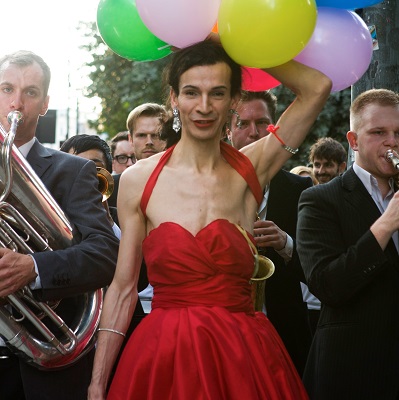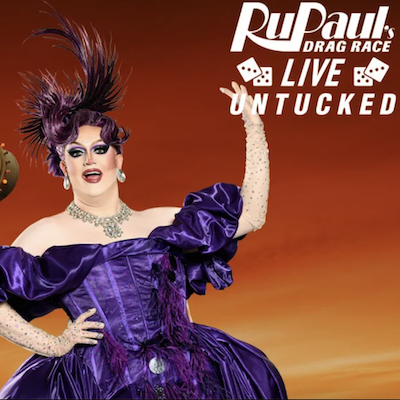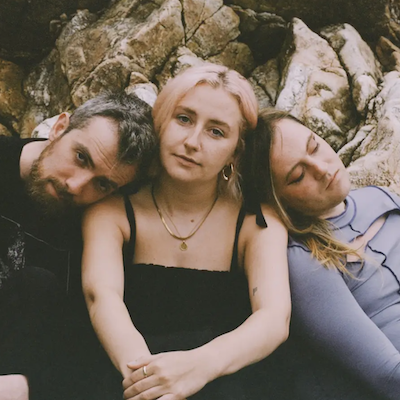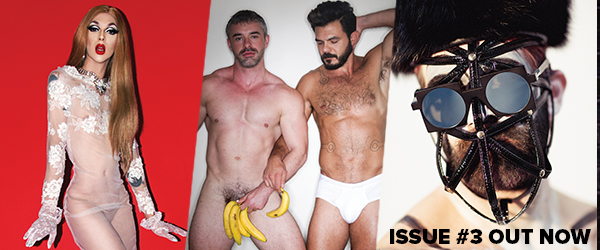
"The word ‘sissy’ is a stand against sissiphobes within and outside of queer culture"
When performance artist Nando Messias was gay bashed outside of theatre space Toynbee Studios he dreamed up the ultimate response incorporating action, reclamation and revenge: The Sissy’s Progress. This dance performance leads the audience out onto the streets with a marching band so that we can experience the bolshy chutzpah of confronting the world, risking abuse and experience the exhilaration of standing up for yourself and your people, despite the risk. Nando is our hero and an incredible artist. As we count down the days until we are strutting alongside Nando and taking part in his Sissy Walk, Fallon Gold spoke to him about performance as activism, what we all need to do about bashing, and the glory of the sissy.
In Loverboy issue 3 the poet Damien Arness Dalton name checks you and The Sissy’s Progress as an example of queer art as activism. Damien says that queer art should be about challenging the status quo. How necessary is the intersection of art and activism to you?
Does he? That’s very nice of him to say that. Activism was not at the forefront of my mind when I started creating The Sissy’s Progress. I was attacked at a time when the rates of hate crime against LGBTQ people were on the rise. I saw what happened to me as not only an opportunity to do something about it but as an obligation. This was not only my problem. I knew it touched other people around me. At the time, I was also concerned about the decline in LGBTQ rights around the world, in countries like Russia, Uganda and, most shamefully, Brazil, my place of birth. I felt it was my responsibility to use the tools I have available to me as an artist to bring more awareness to this issue. My hope with The Sissy’s Progress has been to transform this horrible thing that happened to me into something beautiful, to turn it around.
The Sissy’s Progress takes the audience out on to the street; this is bold and risky. Was this aspect always going to be part of the performance or something that occurred to you to do during the development phase?
Oh, I always knew The Sissy’s Progress would have to be performed on the streets. The initial idea was to visit a site of homophobic abuse in each performance. This hasn’t always been possible but we do that whenever we can. This public aspect has always been central to the piece. It reclaims the streets – the very place where these acts of violence happen most. The parade is also important in the sense that it puts the audience in a vulnerable position. They can experience for themselves, in their own skin, what it is like to be visible on the streets. The marching band is so loud that everyone looks when we walk past. Audience members can therefore understand, intrinsically, how it feels to stand out in public.
You are sometimes heckled by people in the street during Sissy’s Progress; how do you process this as a performer and because of your experience of being a queer person facing such abuse all the time?
Yes, I have, at times, received verbal abuse while performing the piece. This, albeit risky and slightly scary, is also crucial to the performance. But it proves a point: that homophobia still exists. While witnessing instances like these, the audience sees the issue I’m trying to raise at play, in front of their very eyes. So the streets were the only possible scenario for this piece. I’m also careful, of course, to make sure that the audience is safe from harm, which they always are in their numbers. But they do get a taste.
Do members of your audience ever shout back at the hecklers?
To my knowledge, that has never happened yet. But my mother-in-law is due to come see the piece soon and she promised she will. She must think I’m such a sissy.
As a community, but also through queer media, do we need to talk about street harassment and bashing more than we are?
And how. Before fully committing to this piece, I went through periods when I thought there was no real need for a performance like this anymore; that the battle had already been won and so on. Perhaps I was trying to persuade myself everything is fine now. Then, I would get some harassment on the street or at a bus stop or on the tube and the fire in my belly would rekindle. There’s so much work still to be done.
The very title of your show is so multifaceted, not least a reclamation of the word sissy. This is connected to the history of reclaimed words such as queer, dyke, fag, queen etc. There is also still a very prominent anti-femme/anti-’gay acting’ stigma in the community, scene and as witnessed through personal ads etc. You are addressing homophobes through the title of your show, but is your use of ‘sissy’ also a challenge to the anti-nancy stance in queer culture?
My choice of the word ‘sissy’ is firmly attached to the queer strategy of reverse discourse. You’re right. I also agree with you that the stigma around effeminacy is still prevalent in the scene. At least that has been my experience. The word ‘sissy’ is a stand against sissiphobes within and outside of queer culture. The title is also a reference to Hogarth’s ‘The Rake’s Progress,’ a series of paintings describing the demise of a character. If you come and see The Sissy’s Progress, you will realise that the parade, which starts as a celebration of difference takes a sad turn, perhaps even tragic. Lastly, the title also references The Royal Progress, a medieval custom where the monarch would travel the country in the summer to display his/her riches.
BTW, it’s funny you use the word ‘nancy’: Nancy is also a name I have adopted. So Nancy Messias is my name on Twitter and Instagram.
Who are some of your favourite queer artists and performers? Who should we be looking out for?
Jordan Hunt, an amazingly talented and sensitive musician with a beautiful voice and inspiring compositions (he just so happens to be the musical director of The Sissy’s Progress), Theo Adams, Dickie Beau, Scottee.
What’s next for you?
A piece about archive, an investigation of what already exists in me as a source of inspiration. Perhaps something closely connected to my Brazilian roots. A performance about what remains, about the concept of ‘being ready’ rather than ‘waiting to be ready.’ I’m thinking about the impossibility of ideals, utopia, lost dreams; the thought that perhaps I already have all the knowledge, training, inspiration that I need to go forward. Readiness is over-rated.
Walk with Nando in The Sissy’s Progress:
17th/18th March, Toynbee Studios, London
7th May, Marlborough Theatre, Brighton, Brighton Fringe
12th May, Horniman Museum & Gardens, London as part of Queer Lates
Image: Nando Messias @ Toynbee Studios









